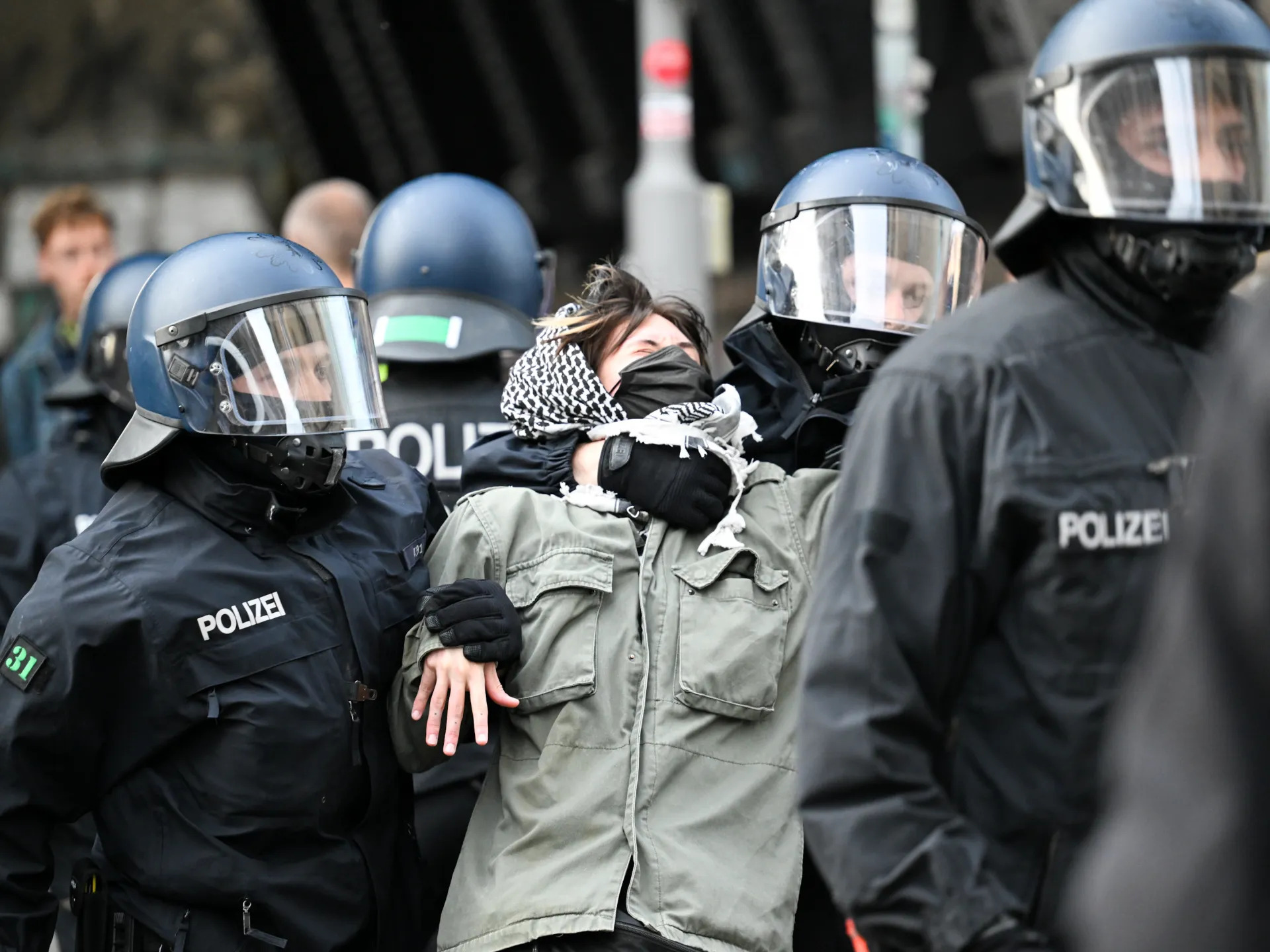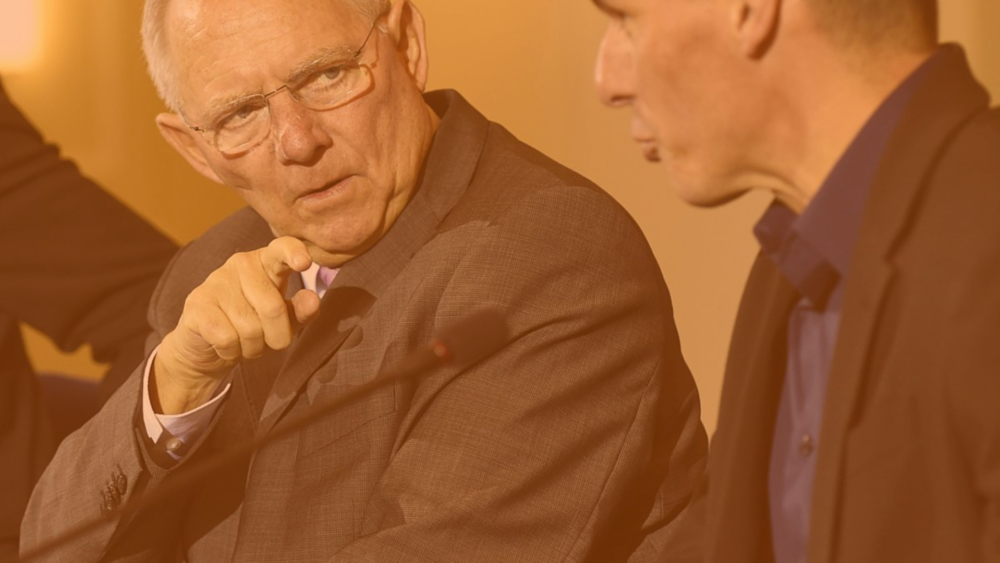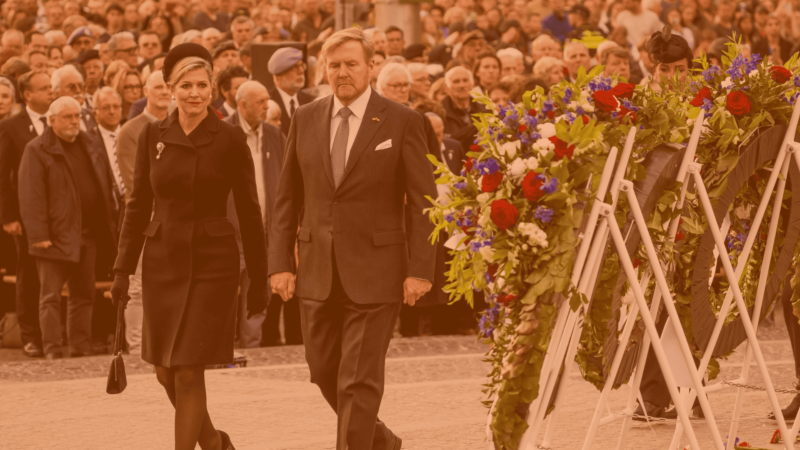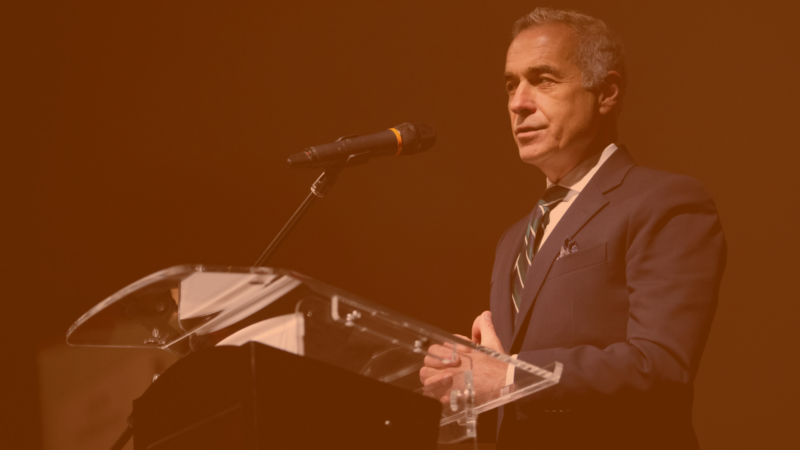Today, nowhere is the moral forefinger more clearly embodied than in Germany’s penchant for patting itself on the back with much-vaunted superlatives that place it at the pinnacle of global virtue
A close relative of mine – non-German, but living in Germany for more than 40 years now – once said: “There is nothing more insufferable than a German who is right.”
That statement for me encapsulates a certain archetype within the German psyche – one that, of course, doesn’t apply to all Germans, yet undeniably represents a strong tendency toward rule-following, an obsession with principled, almost compulsive attention to details, all topped off with that notorious raised index finger, which the German wields with such gusto to remind others of their moral and intellectual inferiority. It’s a figure that thrives on appearing immaculate, while blissfully ignoring the shadows lurking in its own backyard.
It is now exactly ten years ago that I, a German-Greek living in Germany, had my first ‘aha’ experience of that kind.
German media and their smear campaign against Greece
In 2014, Yanis Varoufakis, freshly appointed as Greece’s Finance Minister, found himself via livestream on a primetime German talk show (Günther Jauch) – one known for soothing the worries of the petty bourgeoisie with its polite indignation and middle-brow assurances that everything is in its right place. Everything, that is, except for a Greek like Varoufakis. Instead of his expertise or role as Minister, the focus of the show was on a supposed incident where he had given Germany “the finger” at a “subversive festival” in Zagreb.
How dare he? After all, the virtuous, hard-working German taxpayer had been pouring billions into the coffers of these lazy Greeks, who, basking idly under the sun, were likely indulging in Ouzo rather than embracing the Protestant work ethic expected of them.
After Varoufakis insisted that the video had been doctored, experts – including the guests on the show – were quick to dismiss his claim. Video manipulation, they argued, was not feasible at such a level.
In the following days, the infamous clip of Varoufakis flipping the bird was played again and again, feeding into the narrative of ungrateful Southerners versus upstanding, financially prudent Germans.
But then came Varoufake, young show-master Jan Böhmermann’s satirical masterpiece that unravelled their certainty. In the video, Böhmermann presented the amused public with a Varoufakis double – not to deceive, purely for humorous purposes. The doppelgänger was used to pretend an elaborate re-enactment of the original footage from the Zagreb festival. Böhmermann was shown surrounded by his team, huddled around a computer screen, as his digital wizard casually demonstrated how a few clicks, some blur effects, and slight motion adjustments could transform the hand into whatever gesture they wanted: the infamous middle finger, an innocent pointing finger, and even an open hand – all while maintaining a convincingly realistic look. An artsy move that left the moralists scrambling to determine what was real and what was fake.
Back then, I was already shaking my head in disbelief at what I perceive today as an annoying, dangerous blend of purely racist “civilisational” pretensions, and neo-colonial arrogance.
This was in 2014. It was the height of the Bild-Zeitung’s smear campaign against Greece, a time when every German mainstream newspaper seemed to echo disdain and contempt.
The climax was perhaps the lead article in Focus titled: “2000 Years of Decline: From the Cradle of Europe to its Backyard,” penned by Michael Klonovsky (later the press secretary for the far-right AfD, which is now sweeping one East German state after another).
The article begins with a shower of praise for Ancient Greece, name-dropping philosophers, and statesmen like a curator guiding the reader through a museum of lost treasures. Klonovsky revels in the brilliance of the classical Greeks, only to brutally dismantle modern Greece by comparison. Today’s Greeks, he argues, could boast nothing but greasy food, a single opera house, and an incapacity for even basic engineering – illustrated by a tunnel construction project where workers, starting from opposite ends, failed to meet in the middle by a full 35 meters. The implication is clear: modern Greece has no real culture, no competence, and certainly no greatness. The only Greek of note in recent times was, as he states ironically, Otto Rehhagel, the famous German football coach who led the Greek national team to an unlikely victory in the 2004 European Championship.

Klonovsky’s condemnation reaches a first peak with a chilling nod to Jakob Philipp Fallmerayer, a 19th-century historian who, in a display of racial pseudo-science, claimed that modern Greeks were descendants of “Slavic monsters” rather than the noble Hellenes of antiquity – pretty obvious then, why modern Greeks are “unworthy” of their glorious ancestors, right? Needless to mention here that the idea that the bloodline of a civilisation dictates its cultural and political worth is not just a relic of the 19th century but resonates disturbingly with ideologies that underpinned Nazi racial theories.
To make it worse, Klonovsky shortly after invokes Oswald Spengler, the German philosopher known for his seminal work The Decline of the West, a text that had a profound influence on early 20th-century German nationalist thought and is currently enjoying growing popularity in right-wing circles. Even though his reception by the Nazis remains somewhat contested, Spengler’s cyclical view of history, with its emphasis on the inevitable decline of civilisations and the superiority of the “Faustian” Western man, was used to justify notions of cultural purity and the hierarchical ranking of peoples and nations. By referencing Spengler’s deterministic philosophy, Klonovsky subtly endorses a worldview that sees Greece not just as a failed state but as a civilisation in terminal decay – a natural loser in the grand contest of history. Pure, unadulterated racism at its finest – what a marvel to behold!
And a brilliant move to reinforce one’s own self-image: By juxtaposing the glorious Hellenic past with what he sees as the “degenerate” present, Klonovsky crafts a narrative that not only denigrated modern Greeks but also frames Germany, and by extension the West, as the rightful heirs and arbiters of Europe’s civilisational legacy. It’s no wonder that such a worldview would eventually lead Klonovsky to align with the AfD that embraces the same rhetoric of cultural decline, racial purity, and civilisational struggle.
Not for the first time, but more than ever before, as a sheltered child from a comfortably left-leaning, middle-class household – with a German father and a Greek mother – I felt disbelief and discomfort at this brazen combination of self-righteousness and racism. I felt somehow jolted out of my naïve bubble. It was this year that I gave my first university seminar on the discursive strategies of the infamous media vilification of Greece. The students were sharp, unwavering in their anti-racist stance. To this day, they remain my beacon of hope when it comes to confronting racism. But more on that later.
The double standard of German moralism in its actual foreign policy
Today, nowhere is the moral forefinger more clearly embodied than in Germany’s penchant for patting itself on the back with much-vaunted superlatives that place it at the pinnacle of global virtue.
Take for instance the proud Exportweltmeister title for dominating global trade and alleging a very high working ethos. Also, there is the Erinnerungsweltmeister status, the world champion of memory politics, for having (so the narrative goes) faced its own dark past more thoroughly and honestly than any other nation.
Germany’s claim to the moral high ground has serious immoral implications. As the Exportweltmeister (the world champion in exports) the country’s economic dominance often comes at the expense of its European neighbours. With its enormous trade surplus, Germany has crippled the competitiveness of other European economies while enjoying the moral luxury of blaming the resulting crises on “lazy” and “undisciplined” Greeks, Italians, and Spaniards.
As the self-proclaimed Erinnerungsweltmeister, or world champion in memory politics, (West) Germany has built its moral superiority on a twofold foundation: its conscientious commemoration of the Holocaust, which now serves to justify its unconditional solidarity with Israel, and its triumphalist remembrance of the East German dictatorship, which positions West Germany (that makes up two thirds of unified Germany) as the moral victor of history. Together, these intertwined narratives create a dual moral high ground, giving Germany a sense of ethical supremacy that is wielded both internally and on the global stage.
From this lofty perch, Germany sways gently in a moral pendulum that oscillates between atoned sins and self-righteousness – just the perfect position to keep itself aligned with the USA and stumble together into realpolitik disasters.
The Zeitenwende 2022: An epochal shift towards catastrophe
Since reunification, Germany has supported numerous neo-colonial ventures alongside the United States. Yet in the past, there was still a domestic opposition that could genuinely be called “left” – expressing indignation when the German Greens backed the illegal intervention under international law in Kosovo, voicing resistance to the Iraq war, and condemning involvement in Afghanistan. Today, however, we are witnessing the emergence of a bellicose consensus, a war-mongering unity that sweeps aside any dissent and rallies behind a shared mission of militarism.
These dynamics are starkly visible in the two central arenas of current German foreign policy – the support for Ukraine and the support for Israel’s war in Gaza – which condense and culminate the nation’s idealised self-image.
Since February 2022, it appears, Germany has cast itself as the leader in what it sees as a battle between light and darkness. It is now the largest arms supplier within the EU, contributing over 27 billion euros in military aid to Ukraine. An additional 100 billion euros have been set aside to rearm the Bundeswehr. This dramatic change in Germany’s defence and foreign policy is underpinned by fierce rhetoric from its political leaders. Chancellor Olaf Scholz’s proclamation of a Zeitenwende – an epochal turning point – and Ursula von der Leyen’s vision of a Europe resolutely standing against autocracy are hailed as noble commitments to protect democratic values and ensure European security.
The European way of life also means listening and debating with one another to find solutions for the common good. This is what I want us to do together.
Read more👉https://t.co/gRj4ZoNPNC pic.twitter.com/BjFatzvL1i— Ursula von der Leyen (@vonderleyen) September 16, 2019
In reality, Germany’s government is effectively solidifying its role as the primary architect of a new Cold War in Europe, cementing its role in an alarming shift from the peace dividend, which once redirected defence budgets into social development, to the so-called “European Peace Facility”. This Orwellian term, despite its use of the word peace, masks what is essentially a war fund to funnel weapons and military training into Ukraine.
Yet the consequences of this moral crusade have been dire for Germany itself. The stringent sanctions imposed on Russia, ostensibly to uphold its values, have contributed to an economic downturn and rising energy costs at home. Meanwhile, Germany’s scramble to replace Russian gas with expensive liquefied natural gas from Qatar and fracking gas from the United States has deepened its economic crisis.
All in all, the German government is not only a principal actor in transforming Europe’s peace order into a new war economy. It also paves the way for a closer partnership between Russia and China, further contributing to Europe’s fragmentation and decline into irrelevance.
Despite these alarming developments, Germany’s left-leaning government still sees itself as the ultimate moral authority. Michael Lüders, a sharp critic of German foreign policy, captures this self-image with biting irony, dubbing the country the “Moralweltmeister” – the world champion of morality. Unlike the celebrated titles of Exportweltmeister and Erinnerungsweltmeister, which Germany wears proudly, Lüders’ term reveals the dangerous consequences of this overzealous moralism.
Since October 2023: Palestine and the collapse of the moral façade
Nowhere is this hypocrisy more evident than in Germany’s response to the war in Gaza that Germany fully supports morally grounded in the German Staatsräson, in stating Israel’s right to “defend itself”, while blissfully ignoring and being ignorant to both the history of occupation and Apartheid in Palestine and the routine Israeli war-crimes then and now. The 40,000 dead Palestinians appear as deplorable “collateral damage” to a just cause, and most references of Gazan, Lebanese or Iranian actors or victims are othered and dehumanised in the old, well-known manner.
With its unconditional support for Israel, Germany is not only complicit in genocide, but in pushing the region to a full-scale war. As this article is being drafted, there is frightening evidence that this is already happening.
The domestic witch-hunt of any dissenting voice and the police violence against pro-Palestine protesters goes on. While any solidarity with Palestine risks being labelled anti-Semitic or extremist, even public figures with broad popularity have felt the sting of this silencing climate. The well-known comedians Dieter Hallervorden and Kaja Yanar faced a massive backlash when they publicly criticised Israel’s war.

Even Richard David Precht, Germany’s most prominent philosopher and not even a declared pro-Palestinian voice, found himself at the centre of controversy after making an unfortunate comment about what Orthodox Jews are permitted to work as. The backlash was swift, branding him as anti-Semitic, and resulting in him losing his honorary professorship. Shortly after, he appeared on Jung & Naiv, a progressive interview format, where the topic resurfaced. Precht, who has written extensively on the history of philosophy spanning centuries, is a staunch advocate of universalism – the belief that the same moral principles apply to all people, regardless of nationality or creed. Yet during the interview, he admitted there is one exception to his principle: Germany’s stance on Israel. He suggested that the country’s uncritical support for Israeli policies – without explicitly calling them war crimes – was a necessary exception that, given Germany’s historical guilt, must remain beyond criticism. When confronted with his double standard, he seemed unsettled and irritated, obviously annoyed that his interviewer had cornered him into making such a statement. Having read many of Precht’s books, I was both shocked and embarrassed by this cowardly betrayal of his own values. It’s precisely these displays of German inconsistency – where moral courage folds under pressure – that lay bare the fragility of the nation’s self-professed principles.
What now? With billions spent on the militarisation of Europe and an unswerving allegiance to the narrative of a ‘just’ war, Germany is not merely experiencing a “Zeitenwende” – it is engineering it. The consequences for Europe, and for Germany itself, may be far more catastrophic than its policymakers are willing to acknowledge.
As Europe drifts into insignificance, Germany’s reputation in the Global South continues to sour. It is the only country to support Israel in the ICJ case and remains its second-largest arms supplier. Michael Lüders cites an American study showing that millions across Asia boycott US products due to its foreign policy. He argues that, as the great Exportweltmeister, Germany could face an even greater backlash if consumers in the Global South turn away from its goods in protest against its foreign policy.
But perhaps we can end – not on a positive note, but at least with a glimmer of hope: The resistance from the Global South against Western policy and moral narratives on Israel is growing louder and more organised, both in Europe and beyond. The expanding influence of BRICS and the economic decline of the West signals that we are not heading toward a Euro-American century. This shifting landscape may teach the West a much-needed lesson in humility.
Even in Berlin, despite the police crackdowns, pro-Palestinian demonstrations continue to stand their ground. At universities, student protests and the courage of some outspoken scholars show no signs of abating – despite being smeared and criminalised, despite the German Education Ministry’s attempts to cut funding for those critical of Israel. The tide is shifting, and the West’s monopoly on moral authority may be on the brink of its final unravelling.
Do you want to be informed of DiEM25's actions? Sign up here















